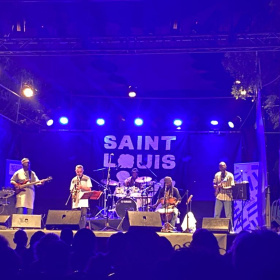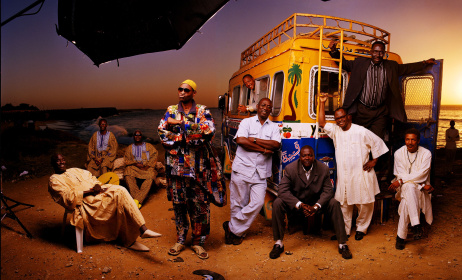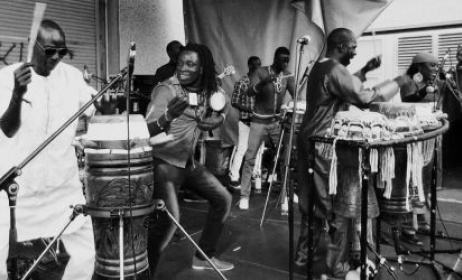Pitchfork critiques white appropriation of African music
Fanta Sylla, daughter of Senegalese producer Ibrahim Sylla, has critiqued western appropriation of African music through her father’s influence on the music of American indie band Vampire Weekend.
 Ibrahim Sylla clutching a record by Nyboma in 1989. Photo: Wikipedia
Ibrahim Sylla clutching a record by Nyboma in 1989. Photo: Wikipedia
In the piece On Hearing My Father’s Legacy in Vampire Weekend, published by Pitchfork, Sylla writes that Vampire Weekend's 2008 first album was given to her by a sibling about a decade ago.
“I remember this meeting feeling almost clandestine, like I wouldn’t be able to find this music anywhere else,” she writes. “Of course, that was far from reality: The album was Vampire Weekend’s self-titled debut, which set into motion one of modern indie rock’s biggest crossovers after it was released...”
Fanta's father, the late Ibrahim Sylla, owned Syllart Records, where he produced music for a large number of artists, including then young musicians Salif Keita, Ismael Lo and Youssou N’Dour. When he died in 2014, an obituary appeared in the Guardian.
"Of all the figures who manoeuvred African music into the world spotlight in the 1980s, Ibrahima Sylla, who has died after a long illness aged 57, was one of the most influential, knowledgable and tasteful," the British paper declared.
Sylla was born in the Ivory Coast to a Guinean father. He attended university in Paris, the European city where he came to own a shop that catered to lovers of African music. As a producer, he tinkered with different genres of African music, adding innovative flourishes, including funk, rock and salsa elements, to the work of several artists. He is reported to have once said: "I have two rules, Never sign a contract with an artist for more than one album, and never do what people expect you to."
The occasion for the younger Sylla’s piece in Pitchfork was the tenth anniversary of the Vampire Weekend self-titled debut. "In Vampire Weekend, my sister and I recognised the voices and hands that had been present in our various homes,” Sylla notes. “It spoke directly to us, from the first notes of 'Mansard Roof', reminiscent of the syncopated sabar (traditional drums) of mbalax, to the springy rumba of 'Bryn' and the call and response of 'One (Blake’s Got a New Face)' ’s chorus."
Sylla's article touches on issues that arise from western appropriation of African music. On criticism of Vampire Weekend, she writes that "they had it coming. It is all in the words they used to describe their sound—Upper West Side Soweto—which was gleefully repeated in the press, and later came to describe an entire wave of indie rock flirtation with African music...There is a hierarchy hidden in this juxtaposition of South African townships and the chic neighborhoods of New York."
She adds: "Also, why Soweto, and not Kinshasa, the Congolese town one should associate with soukous and rumba? Going through old Vampire Weekend interviews, the band’s members rarely shouted out African musicians beyond Fela Kuti, who has become the black best friend of the Western world when it comes to African music. This is something blackness and especially Africanness magnetise: generalisation and neglect...But rather than calling out white artists who appropriate African music, I’ve always been more concerned that the African genres and artists that inspired them were given proper credit and financial support."
Fanta Sylla, however, ends on a positive note regarding Vampire Weekend's appropriation of a sound shaped by her late father. "Of all the indie bands that surfed on the so-called Afropop wave," she writes. "Vampire Weekend is, to me, the one that most elegantly and precisely returned to...aspects of the original story."






















Commentaires
s'identifier or register to post comments